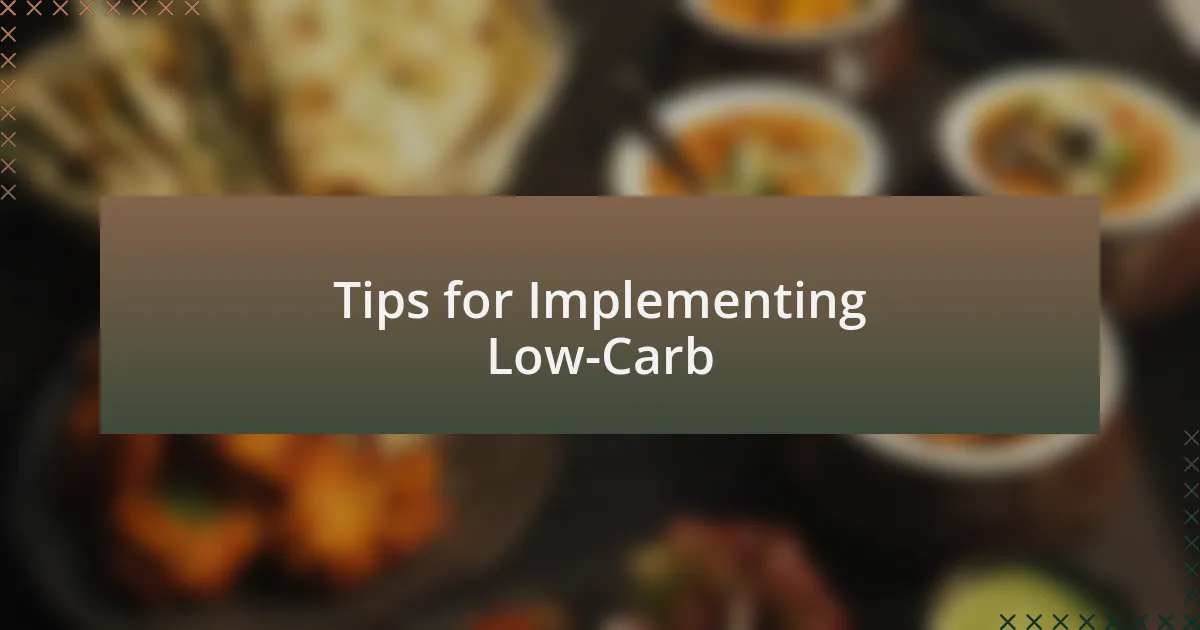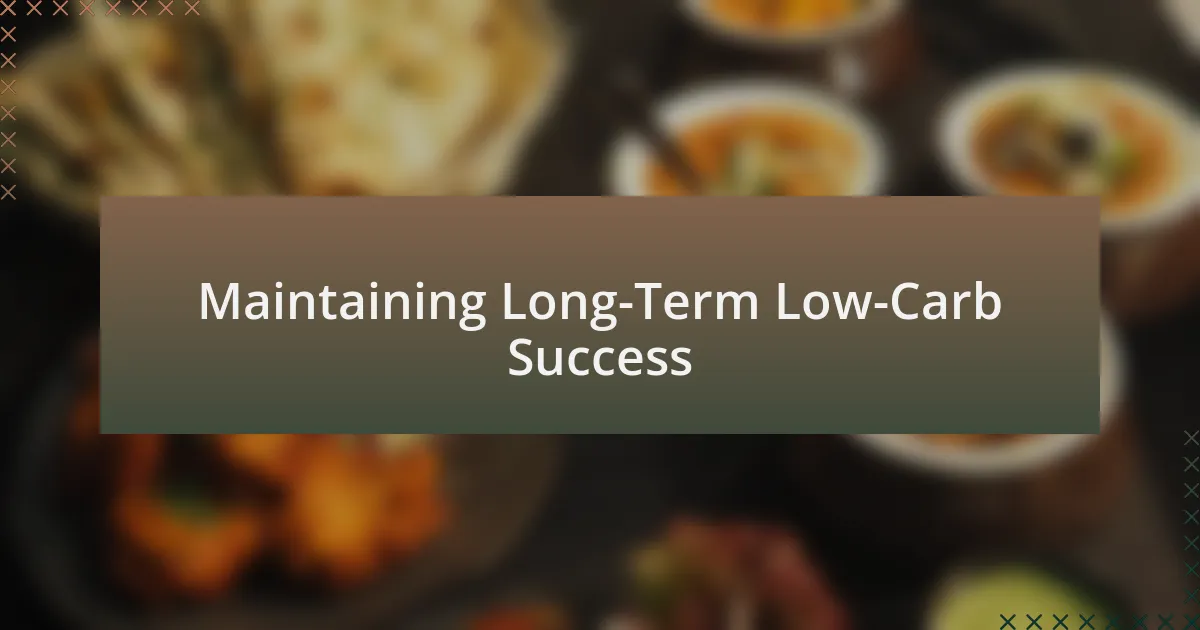Key takeaways:
- Healthy eating is about nourishing the body with whole, unprocessed foods and making informed dietary choices.
- Low-carb diets reduce carbohydrate intake while increasing proteins and healthy fats, leading to consistent energy levels and improved appetite regulation.
- Common myths about low-carb eating include the misconception that it means completely eliminating carbs and that it’s solely for quick weight loss.
- Long-term success in low-carb eating involves meal planning, gradual changes, and finding support from a community.

Overview of Healthy Eating
Healthy eating is all about nourishing your body with the right balance of nutrients. It involves more than just counting calories; it’s about choosing whole, unprocessed foods that fuel your energy and support overall well-being. When I switched to a more mindful diet, I found myself more alert and energized, which made such a difference in my daily life.
Many people often wonder, “Is healthy eating just a trend?” I believe that it’s a lifestyle rooted in making informed choices about what goes on our plates. For instance, I vividly recall the moment I started paying attention to food labels. I realized how many hidden sugars are in everyday products, prompting me to embrace more fresh fruits and vegetables.
It can feel overwhelming at times, but the beauty of healthy eating lies in its flexibility. We don’t have to be perfect; small changes can lead to significant improvements. I remember the day I decided to swap my usual snack chips for a handful of nuts and fruit. That simple switch not only satisfied my cravings but also gave me a sense of accomplishment in my healthy eating journey.

Understanding Low-Carb Diets
Low-carb diets focus on reducing carbohydrate intake while increasing proteins and healthy fats. When I first explored this approach, I found it intriguing that many foods I loved, like avocados and cheese, became staples in my meals. This shift not only made me feel fuller for longer but also helped me understand how closely linked food choices are to our overall energy levels.
The science behind low-carb eating suggests that reducing carbs can help regulate blood sugar levels and assist in weight management. I was surprised to learn that many people experience a mental clarity and reduced cravings as a bonus. Honestly, it felt like a revelation to discover that something as simple as changing my macronutrient balance could have such a profound effect on both my body and mind.
Adopting a low-carb diet doesn’t mean depriving yourself; it invites creativity in the kitchen. I remember experimenting with cauliflower rice and zucchini noodles, which transformed my favorite dishes while keeping my carb count low. Have you ever tried swapping your traditional pasta for a vegetable alternative? It was a game changer for me, allowing me to enjoy comfort food without the guilt.

Benefits of Low-Carb Eating
One of the standout benefits of low-carb eating for me has been the steady energy levels throughout the day. Initially, I feared that cutting back on carbs would leave me feeling sluggish. However, I was pleasantly surprised to find that my energy didn’t spike and drop like it used to; instead, it felt consistent. Have you ever noticed how certain meals can leave you in a fog? That fog faded away for me, and I became more productive.
Another remarkable advantage is the impact on appetite regulation. I often found myself snacking mindlessly or reaching for sugary treats when I followed a higher-carb diet. Switching to a low-carb approach changed all that; I became more in tune with my body’s hunger signals. Listening to those signals made me realize how often I ate out of boredom rather than need. Doesn’t it feel liberating to break that cycle?
Weight loss has also been a notable benefit for many who adopt low-carb eating. I’ve seen friends shed pounds effortlessly, and it sparked my curiosity about how lower insulin levels play a role. When I adjusted my meals, I noticed that I felt satisfied with smaller portions, which, in the long run, contributed to my own weight management journey. Have you ever experienced that satisfying fullness after a meal without feeling stuffed? It’s a fantastic shift, and it definitely changed my approach to food.

Common Myths about Low-Carb
Many people assume that low-carb eating means giving up all carbohydrates entirely, but that’s simply not true. In my experience, it’s not about eliminating carbs; it’s about choosing the right ones. I remember when I first started, I thought fruits were off-limits, but discovering low-glycemic options made a world of difference. Have you ever realized how diverse the category of carbs can be?
Another common myth is that low-carb diets are high in unhealthy fats. I’ve had friends express concern that consuming fats would lead to heart issues, but I’ve seen how healthy fats can be beneficial. Incorporating avocados and olive oil into my meals not only enhanced flavor but also contributed to that steady energy I mentioned earlier. It’s surprising how misconceptions can hold us back from exploring new foods.
Some believe that low-carb eating is only effective for quick weight loss, but I’ve found it to promote long-term healthy habits. Initially, I saw a drop on the scale, but more importantly, it reshaped my relationship with food. Have you ever noticed a diet that makes you feel deprived? This was different; I felt empowered and in control. It transformed my approach to eating, creating a sustainability that kept me motivated in the long run.

Tips for Implementing Low-Carb
One of the first tips I’d offer for implementing low-carb eating is to start by slowly reducing your carbohydrate intake rather than making abrupt changes. I remember when I tried to cut out bread entirely in one go; it left me feeling deprived and cranky. Instead, gradually swapping out white bread for whole grain or even cauliflower alternatives made the transition smoother for me. Have you noticed how small changes can often lead to bigger lifestyle shifts?
Focusing on whole, nutrient-dense foods has been a game-changer for me. When I shifted my mindset from counting carbs to thinking about the quality of the food I was consuming, I started feeling more satisfied after meals. For example, I began incorporating more leafy greens and colorful vegetables into my plate, which not only filled me up but also made meals more vibrant. When was the last time you evaluated the nutritional value of what you were eating instead of just the carb count?
Planning your meals in advance is another practical tip I swear by. I make it a point to set aside a little time each week to prep healthy, low-carb options. This habit not only saves me from last-minute unhealthy choices but also allows me to experiment with new recipes and flavors. Have you ever found that pre-prepped meals lead to stress-free weekdays? It works wonders for maintaining a balanced approach to eating.

Balanced Meal Ideas for Low-Carb
When it comes to creating balanced low-carb meals, I often find that a rich salad is my go-to choice. One of my favorites includes grilled chicken, avocado, and mixed greens, topped with a sprinkle of feta cheese and a drizzle of olive oil. The combination not only satisfies my hunger but also brings a delightful variety of textures and flavors to my plate. Have you ever tasted how the creaminess of the avocado complements the crunch of fresh vegetables?
Another meal that I absolutely love is stuffed bell peppers. I typically fill them with a mix of ground turkey, spinach, and spices, then bake until they’re tender. This dish is not just filling but also colorful, making it visually appealing. Honestly, there’s something about digging into a beautifully presented meal that enhances the dining experience, don’t you think?
For a hearty breakfast option, I recommend a veggie omelet loaded with mushrooms, bell peppers, and a sprinkle of cheese. I savor each bite, knowing I’m fueling my body right at the start of the day. The protein keeps me satisfied throughout the morning, eliminating the need for those mid-morning carb-laden snacks. Have you tried starting your day with such a nutritious meal? It’s simply a fantastic way to kick off the day on the right note!

Maintaining Long-Term Low-Carb Success
Maintaining long-term success on a low-carb diet requires a mindset shift. I remember how overwhelming it felt when I first began; the key was to focus on sustainable changes rather than quick fixes. Have you ever noticed how much easier it is to stick with a new habit when it feels natural?
Another factor that’s been crucial for me is meal planning. Taking a little time each week to prepare low-carb meals has dramatically reduced my chances of reaching for unhealthy snacks on busy days. I find that creating a variety of dishes keeps my taste buds excited—wouldn’t it be great if every meal felt like a treat?
Lastly, embracing a supportive community can make a world of difference. Sharing my journey with friends who understand the ups and downs of low-carb living has not only motivated me but also provided a space for encouragement. Have you ever felt empowered by those around you? Finding that connection can transform your experience and keep you committed for the long haul.